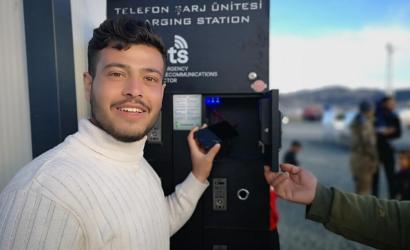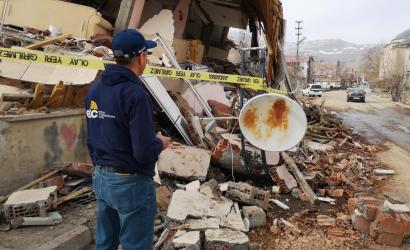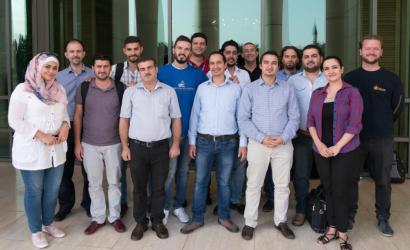Türkiye
ETC security communications (support for UHF radio programming and coverage) and customer services are provided by the cluster in the UN hub in Gaziantep in Türkiye as part of the ‘Whole of Syria’ (WoS) response, to ensure a unified response to the Syrian crisis. ETC services in Gaziantep support UN responders to provide cross border humanitarian assistance to Syria.
The ETC activities in Gaziantep were launched in 2015 as part of a project to strengthen the emergency communications systems at operational locations in south-eastern Türkiye.
Following the devastating earthquake which hit southern Türkiye on 6 February 2023, an emergency coordinator deployed to Türkiye on 8 February to initiate interagency ICT coordination as well as assess needs for the interagency humanitarian community.
ICT Profile
Disaster and Emergency Management Authority (AFAD)
Ministry of Transport, Maritime and Communications
Information and Communication Technologies Authority (ICTA)
84.78 million
Türkiye straddles the continents of Europe and Asia, covering an area of 783,356 square kilometres, . Population is just above 84,7 million (World Bank data 2021). Capital city is Ankara and is home to 5,6 million people. Largest city is Istanbul (Türkiye's economic and cultural capital, with a population of 15.84 million.
Türkiye is in an active earthquake zone. Most of Türkiye sits on the Anatolian plate between two major faults, the North Anatolian Fault and East Anatolian Fault.The tectonic plate is colliding northwards into the southern rim of Eurasia and forcing Türkiye to be squeezed out towards the west. Türkiye is moving west about 2 centimetres per year along the East Anatolian fault.
A devastating 7.8 earthquake hit south-eastern Türkiye in the early hours of 6 February 2023 affecting an area of 400 kilometres, including Syria.The epicenter of the 7.8-magnitude quake was 23 kilometres ( east of Nurdagi, in Turkey's Gaziantep province, at a depth of 24.1 kilometres.The quakes hit areas that generate about one-tenth of Turkey's national income, damaging airports in Adiyaman, Kahramanmaras, Malatya and Hatay. Türkiyish authorities, through the Disaster and Emergency Management Authority (AFAD) mobilized state emergency teams to prioritize search and rescue in the region.
Lira (₺)
Score: 4.7; Risk Class: Medium
+90
.tr
230V/50Hz
Yes
Turkey Inter-Agency Communication with Communities (CwC) Toolkit
The CwC Technical Taskforce was formed in April 2017. Based in Gaziantep, the Technical Taskforce aims to ensure that CwC efforts in the South East are coordinated and that CwC is two-way, continuous, coherent and relevant. It is an inter-agency, multi-sector body that acts as a technical group for the Inter-Agency Taskforce (IATF) and Inter-Sector Working Group (ISWG) in the South East; it also acts as a focal point for information sharing on CwC good practices, guidelines and developments. It is anticipated that good practices and lessons learned relating to CwC coordination in South-East Turkey may be replicated at the national level.
Membership in the Technical Taskforce is open to actors that are actively engaged in CwC-related actvities, and which have expertise either directly or through programme implementation in CwC service delivery and communication channels.
For information on how to join the CwC Technical Taskforce or community of practice, or to suggest additional materials or guiding documents, please contact Kasita Rochanakorn at rochanak@unhcr.org.
There are road access constraints between Gölbaşı and Karanlikdere, and between Gaziantep and Bahçe (General Directorate of Highways)
Malatya, Adana, Diyarbakır, Adıyaman Airports are open to flights // Gaziantep and Şanlıurfa Airports are open to aid flights // Kahramanmaraş and Hatay airports are closed to flights due to damage.
Adana Airport (ADA) open for all flights // Gaziantep Airport (GZT) open for only rescue and humanitarian support flights // Malatya Airport (MLX) open for only rescue and humanitarian support flights (UPS Foundation).
Kahramanmaraş Airport (Türkiye) is closed to civilian traffic.
Iskenderun Port (Türkiye) reported as closed.
15
102
21.39
74.8
70.7
98%
Türkiye’s Disaster and Emergency Management Authority (AFAD) operates under the Ministry of Interior, in accordance with Presidential Decree No. 4 issued on July 15, 2018.
The Decree defines the purpose and scope of the Presidency as being:
To take the necessary measures for the effective provision of services concerning disaster and emergency recovery and civil defense at a country level, ensuring preparedness and risk reduction before events occur to provide coordination among institutions and agencies in charge of response and recovery operations during and after such events to conduct and coordinate humanitarian aid operations at home and abroad; and to formulate and implement policy recommendations related to these issues. According to the institutional structure and duties of AFAD, as set out by the law, it has a horizontal and flexible administrative structure and is result-oriented in terms of the execution of its duties. The institution has no hierarchical structuring under the departments, and can create working groups to which it can assign personnel also from outside the institution, if required.
General Telecommunications Framework
Telecommunications Law No. 4673 of 12.5.2001
Telecommunications Law No. 4502 of 29.01.2000
Universal Service Law 2005
These laws set out the general legal framework for telecommunications in Türkiye. They contain a detailed institutional framework. They include licensing, competition policy, quality service, interconnection, scarce resources management, universal service and tariffs regulation. It also covers the television service. This law addresses universal service regime.
The government agency responsible for regulating drones in the Republic of Türkiye is called the General Directorate of State Airports Authority (GDSAA) and falls under the Ministry of Transport and Infrastructure.
The Turkish Civil Aviation Code numbered 2920 and dated 14.10.1983 (the “Code”) is the main instrument governing all aspects of aviation from the recognition of the “state sovereignty principle”, aircraft incidents and investigation process, licensing of commercial air operators and airports, liability, air transportation contracts, tariff of fares to the rights over an aircraft, the registry and administrative authority and aircraft insurance.
Having said that, rules and procedures concerning importation, sale, registration, airworthiness and operations of UAVs are specifically laid down in the Directive on Unmanned Aircraft Systems (the “Directive”) issued by the General Directorate of Civil Aviation (the “General Directorate”) of Türkiye. This Directive has been amended recently on 12.07.2020.


